Module 9 Friendship Unit 1 Could I ask if you've mentioned this to her?课件(共48张PPT)+内嵌音频
文档属性
| 名称 | Module 9 Friendship Unit 1 Could I ask if you've mentioned this to her?课件(共48张PPT)+内嵌音频 | 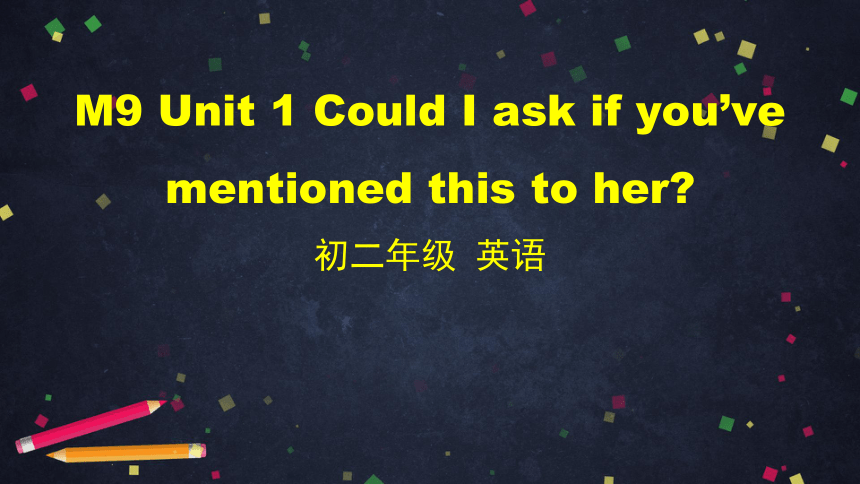 | |
| 格式 | zip | ||
| 文件大小 | 40.4MB | ||
| 资源类型 | 教案 | ||
| 版本资源 | 外研版 | ||
| 科目 | 英语 | ||
| 更新时间 | 2020-06-21 08:01:12 | ||
图片预览




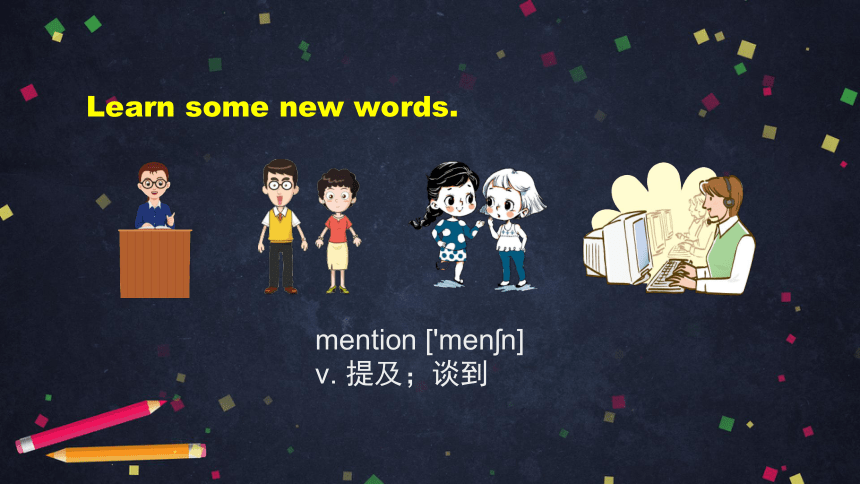
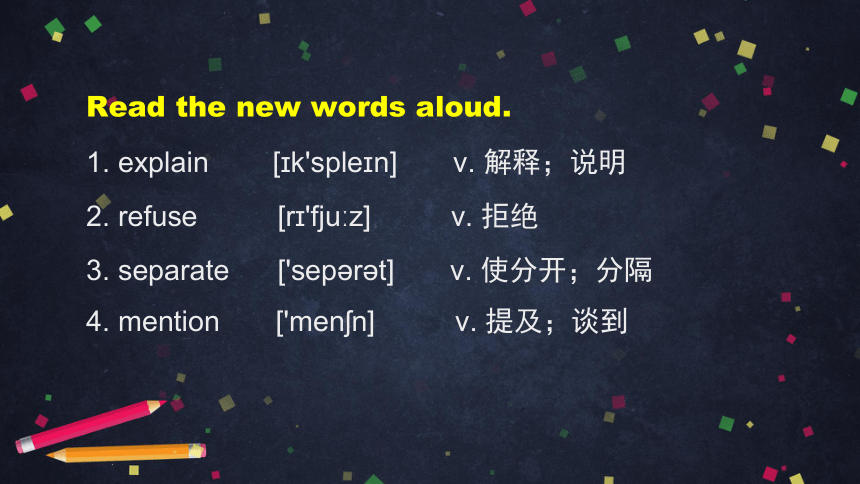

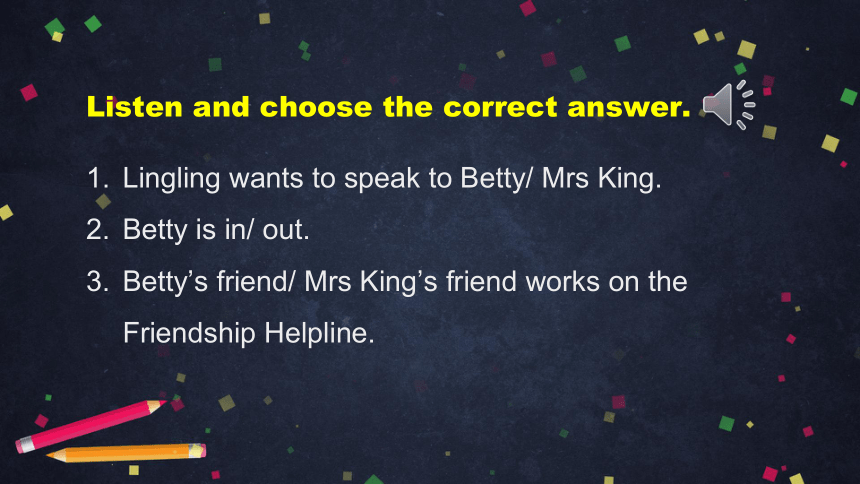

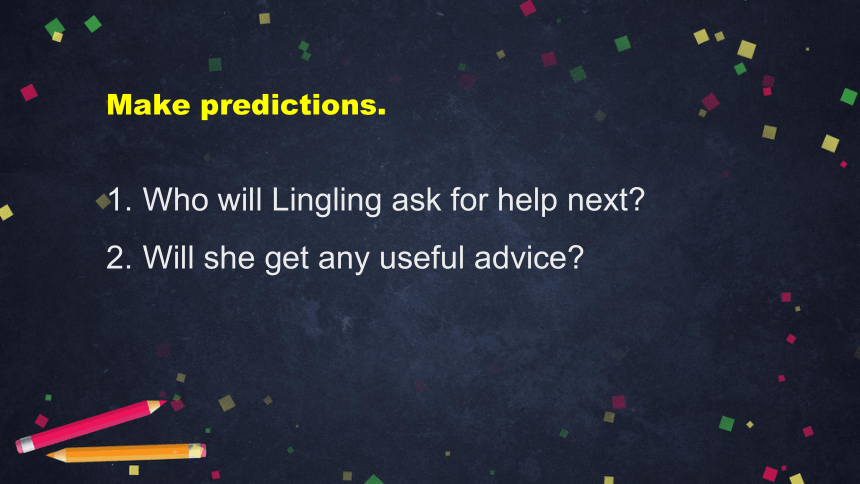
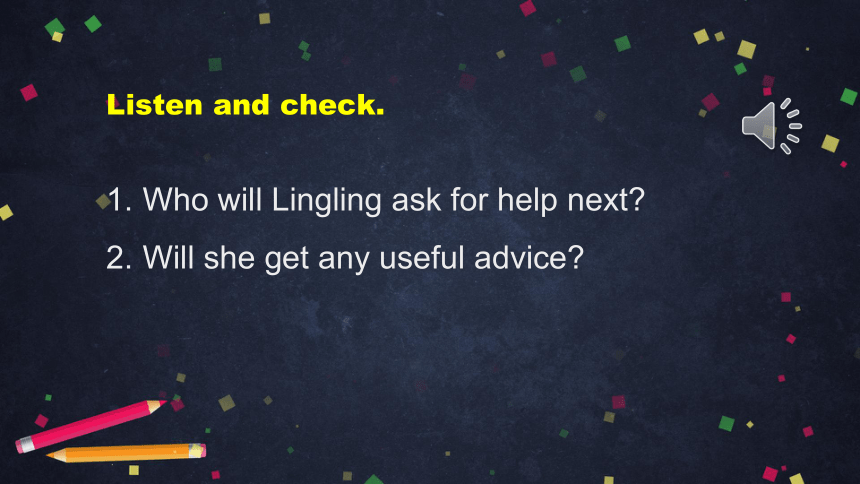
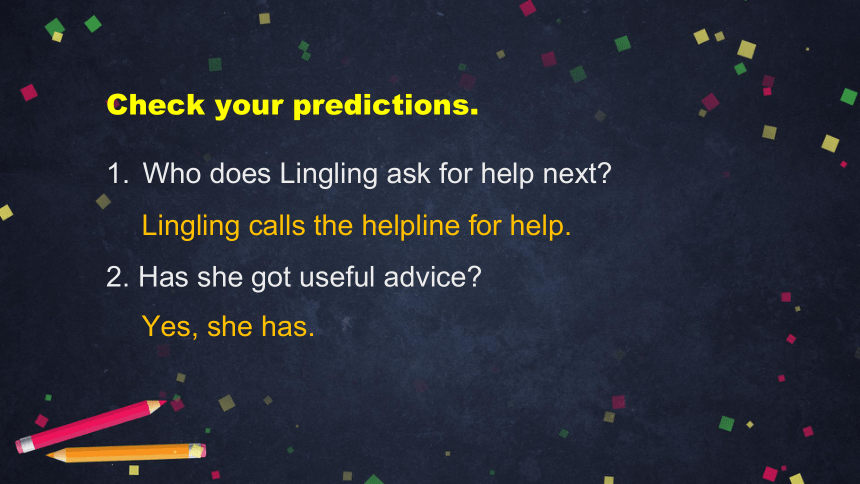
文档简介
(共48张PPT)
M9
Unit
1
Could
I
ask
if
you’ve
mentioned
this
to
her?
初二年级
英语
We
like
our
friends.
Sometimes
we
may
have
problems
with
them.
We
do
interesting
things
together.
Learn
some
new
words.
explain
[?k'sple?n]
v.
解释;说明
refuse
[r?'fju?z]
v.
拒绝
Learn
some
new
words.
separate
['sep?r?t]
v.
使分开;分隔
Learn
some
new
words.
mention
['men?n]
v.
提及;谈到
Read
the
new
words
aloud.
2.
refuse
[r?'fju?z]
v.
拒绝
1.
explain
[?k'sple?n]
v.
解释;说明
3.
separate
['sep?r?t]
v.
使分开;分隔
4.
mention
['men?n]
v.
提及;谈到
Lingling
is
having
a
problem
with
her
best
friend.
Who
is
she
going
to
talk
with
about
her
problem?
Listen
and
choose
the
correct
answer.
Lingling
wants
to
speak
to
Betty/
Mrs
King.
Betty
is
in/
out.
Betty’s
friend/
Mrs
King’s
friend
works
on
the
Friendship
Helpline.
Listen
and
choose
the
correct
answer.
Lingling
wants
to
speak
to
Betty/
Mrs
King.
Betty
is
in/
out.
Betty’s
friend/
Mrs
King’s
friend
works
on
the
Friendship
Helpline.
Make
predictions.
Who
will
Lingling
ask
for
help
next?
Will
she
get
any
useful
advice?
Listen
and
check.
Who
will
Lingling
ask
for
help
next?
Will
she
get
any
useful
advice?
Check
your
predictions.
Who
does
Lingling
ask
for
help
next?
2.
Has
she
got
useful
advice?
Lingling
calls
the
helpline
for
help.
Yes,
she
has.
Listen
and
check.
1.
Lingling
and
her
best
friend
got
separated
but
stayed
in
touch.
2.
Lingling’s
best
friend
went
to
study
at
her
school
this
term.
3.
Lingling’s
new
friends
don’t
like
her
best
friend.
4.
Lingling
has
mentioned
the
problem
to
her
best
friend
but
she
refused
to
listen.
T
T
F
T
Listen
and
choose.
Try
to
find
out
without
you
.
B
and
explain
to
her
that
she
can
make
friends
with
your
other
friends.
A
C
Try
to
to
your
new
friends.
A.
Be
patient
with
her
B.
whether
she
feels
lonely
C.
introduce
her
Tell
me
when
the
problem
started.
Could
you
explain
what
happened
then?
Can
you
tell
me
how
she’s
different?
Could
I
ask
if
you’ve
mentioned
this
to
her?
Do
you
know
why
she
treats
you
like
that?
Lingling’s
problem
got
separated;
stayed
in
touch;
came
to;
was
different;
didn’t
like;
refused
to
listen
Ask
questions
in
a
logical
way
Describe
a
problem
logically
Give
some
advice
Describe
the
problem
logically
Problem-solving
Advice
feels
lonely
be
patient;
explain;make
friends
with
introduce
Listen
and
find
out
the
words
the
speaker
stresses.
Don’t
tell
me
who
she
is.
Tell
me
when
the
problem
started.
Can
you
tell
me
how
she’s
different?
Maybe
she
doesn’t
feel
very
sure
of
herself
in
her
new
school.
I’ll
encourage
her
to
join
in
more.
Listen
and
find
out
the
words
the
speaker
stresses.
1.
Don’t
tell
me
who
she
is.
2.
Tell
me
when
the
problem
started.
3.
Can
you
tell
me
how
she’s
different?
4.
Maybe
she
doesn’t
feel
very
sure
of
herself
in
her
new
school.
5.
I’ll
encourage
her
to
join
in
more.
Watch
and
read.
Complete
the
passage
with
the
correct
form
of
the
words
in
the
box.
encourage
herself
introduce
lonely
patient
regret
separate
treat
encourage
herself
introduce
lonely
patient
regret
separate
treat
When
you
get
(1)
from
a
friend,
it
may
create
problems
for
your
friendship.
She
may
not
want
you
to
see
your
other
friends.
If
this
is
the
case,
she
probably
(2)
you
like
that
because
she
does
not
feel
sure
of
(3)
.
separated
treats
herself
encourage
herself
introduce
lonely
patient
regret
separate
treat
lonely
regrets
patient
introduce
encourage
Language
Focus
So
be
patient
with
her
and
explain
to
her
that
she
can
make
friends
with
your
other
friends
too.
patient
adj.
有耐心的;有耐性的
e.g.
Dinner
will
be
ready
in
half
an
hour.
Just
be
patient!
e.g.
The
patient
is
seriously
ill.
n.
病人
Language
Focus
e.g.
Learning
to
play
the
piano
takes
hard
work
and
patience.
patience
n.
耐心;耐性
impatient
adj.
不耐烦的;没有耐性的
e.g.
Don’t
be
so
impatient.
The
bus
will
be
here
soon.
Language
Focus
2.
Do
you
know
why
she
treats
you
like
that?
treat
v.
对待
e.g.
Treat
these
glasses
with
care.
v.
看待
e.g.
They
treated
my
idea
as
a
joke.
Language
Focus
e.g.
Several
people
were
treated
for
burns
yesterday.
v.
治疗;医治
e.g.
I
treated
the
children
to
an
ice
cream.
v.
请(客);款待
e.g.
My
dad
took
me
to
the
theatre
as
a
treat.
n.
请(客);款待
Grammar
Focus
1.
Could
I
ask
if
you’ve
mentioned
this
to
her?
2.
Try
to
find
out
whether
she
feels
lonely
without
you.
5.
Can
you
tell
me
how
she’s
different?
4.
Could
you
explain
what
happened
then?
3.
Tell
me
when
the
problem
started.
6.
Do
you
know
why
she
treats
you
like
that?
2.
Do
you
know
when
we
will
hold
the
meeting?
1.
He
asks
whether
we
will
go
fishing
this
Sunday.
Translate
the
following
sentences.
3.
They
haven’t
decided
where
they
should
go
for
the
holiday.
4.
I
don’t
understand
why
they
like
computer
games
so
much.
Work
in
pairs.
Talk
about
the
problems
with
friendship.
David
calls
the
Friendship
Helpline
to
ask
for
advice
on
his
problems.
Jason
works
on
the
Friendship
Helpline.
He
listens
to
David’s
problems
and
tries
to
help
him.
—
Tell
me
when
the
problem
started.
—
Could
you
explain
what
happened
then?
—
Can
you
tell
me
how
she’s
different?
—
Could
I
ask
if
you’ve
mentioned
this
to
her?
—
Do
you
know
why
she
treats
you
like
that?
Situation
1
This
is
Jason
on
the
Helpline.
How
can
I
help
you?
This
is
David
speaking.
I
have
a
problem
and
need
your
help.
I’m
shy
and
haven’t
had
many
friends.
Situation
1
Tell
me
when
the
problem
started.
While
I
was
in
the
primary
school,
I
lived
far
from
school.
After
school,
I
hurried
back
home.
I
didn’t
have
time
to
play
with
my
classmates.
Situation
1
So
could
you
explain
what
happened
then?
I
always
sat
on
my
seat
alone
because
I
didn’t
know
how
to
get
along
with
them.
Situation
1
Could
I
ask
if
you’ve
mentioned
the
problem
to
anyone?
No,
I
haven’t.
Could
you
give
me
some
advice?
Situation
1
Sure.
Talk
about
your
problem
with
your
teachers.
They
will
help
you
communicate
with
your
classmates.
Introduce
yourself
to
them.
Soon
you
will
make
some
friends.
I
see.
I’ll
have
a
try.
Thanks.
Situation
1
No
problem,
David.
You’re
welcome!
Situation
2
This
is
Jason
on
the
Helpline.
How
can
I
help
you?
This
is
David
speaking.
I
had
a
fight
with
my
best
friend
and
we
don’t
talk
to
each
other
now.
Situation
2
…
…
Situation
2
Tell
me
when
the
problem
started.
Last
week,
I
got
the
first
place
in
the
math
exam,
but
my
best
friend
failed.
Situation
2
So
could
you
explain
what
happened
then?
I
showed
off
my
paper
in
front
of
him.
He
became
so
angry
that
we
had
a
fight.
Situation
2
Do
you
know
why
he
was
so
angry?
Because
I
ignored
his
feelings.
I
regret
hurting
him.
Could
you
give
me
some
advice?
Situation
2
Try
to
say
sorry
to
him
first
and
explain
to
him
that
you
shouldn’t
ignore
his
feelings.
Encourage
him
to
work
harder
and
help
him
with
his
math.
I
see.
I
will
apologize
to
him
first.
Thanks.
Situation
2
No
problem,
David.
You’re
welcome!
Situation
3
This
is
Jason
on
the
Helpline.
How
can
I
help
you?
This
is
David
speaking.
I
have
to
go
to
a
new
school,
but
I
don’t
want
to
leave
my
friends.
Situation
3
…
…
Homework
1.
大声朗读课文。
2.
完成对话练习。
M9
Unit
1
Could
I
ask
if
you’ve
mentioned
this
to
her?
初二年级
英语
We
like
our
friends.
Sometimes
we
may
have
problems
with
them.
We
do
interesting
things
together.
Learn
some
new
words.
explain
[?k'sple?n]
v.
解释;说明
refuse
[r?'fju?z]
v.
拒绝
Learn
some
new
words.
separate
['sep?r?t]
v.
使分开;分隔
Learn
some
new
words.
mention
['men?n]
v.
提及;谈到
Read
the
new
words
aloud.
2.
refuse
[r?'fju?z]
v.
拒绝
1.
explain
[?k'sple?n]
v.
解释;说明
3.
separate
['sep?r?t]
v.
使分开;分隔
4.
mention
['men?n]
v.
提及;谈到
Lingling
is
having
a
problem
with
her
best
friend.
Who
is
she
going
to
talk
with
about
her
problem?
Listen
and
choose
the
correct
answer.
Lingling
wants
to
speak
to
Betty/
Mrs
King.
Betty
is
in/
out.
Betty’s
friend/
Mrs
King’s
friend
works
on
the
Friendship
Helpline.
Listen
and
choose
the
correct
answer.
Lingling
wants
to
speak
to
Betty/
Mrs
King.
Betty
is
in/
out.
Betty’s
friend/
Mrs
King’s
friend
works
on
the
Friendship
Helpline.
Make
predictions.
Who
will
Lingling
ask
for
help
next?
Will
she
get
any
useful
advice?
Listen
and
check.
Who
will
Lingling
ask
for
help
next?
Will
she
get
any
useful
advice?
Check
your
predictions.
Who
does
Lingling
ask
for
help
next?
2.
Has
she
got
useful
advice?
Lingling
calls
the
helpline
for
help.
Yes,
she
has.
Listen
and
check.
1.
Lingling
and
her
best
friend
got
separated
but
stayed
in
touch.
2.
Lingling’s
best
friend
went
to
study
at
her
school
this
term.
3.
Lingling’s
new
friends
don’t
like
her
best
friend.
4.
Lingling
has
mentioned
the
problem
to
her
best
friend
but
she
refused
to
listen.
T
T
F
T
Listen
and
choose.
Try
to
find
out
without
you
.
B
and
explain
to
her
that
she
can
make
friends
with
your
other
friends.
A
C
Try
to
to
your
new
friends.
A.
Be
patient
with
her
B.
whether
she
feels
lonely
C.
introduce
her
Tell
me
when
the
problem
started.
Could
you
explain
what
happened
then?
Can
you
tell
me
how
she’s
different?
Could
I
ask
if
you’ve
mentioned
this
to
her?
Do
you
know
why
she
treats
you
like
that?
Lingling’s
problem
got
separated;
stayed
in
touch;
came
to;
was
different;
didn’t
like;
refused
to
listen
Ask
questions
in
a
logical
way
Describe
a
problem
logically
Give
some
advice
Describe
the
problem
logically
Problem-solving
Advice
feels
lonely
be
patient;
explain;make
friends
with
introduce
Listen
and
find
out
the
words
the
speaker
stresses.
Don’t
tell
me
who
she
is.
Tell
me
when
the
problem
started.
Can
you
tell
me
how
she’s
different?
Maybe
she
doesn’t
feel
very
sure
of
herself
in
her
new
school.
I’ll
encourage
her
to
join
in
more.
Listen
and
find
out
the
words
the
speaker
stresses.
1.
Don’t
tell
me
who
she
is.
2.
Tell
me
when
the
problem
started.
3.
Can
you
tell
me
how
she’s
different?
4.
Maybe
she
doesn’t
feel
very
sure
of
herself
in
her
new
school.
5.
I’ll
encourage
her
to
join
in
more.
Watch
and
read.
Complete
the
passage
with
the
correct
form
of
the
words
in
the
box.
encourage
herself
introduce
lonely
patient
regret
separate
treat
encourage
herself
introduce
lonely
patient
regret
separate
treat
When
you
get
(1)
from
a
friend,
it
may
create
problems
for
your
friendship.
She
may
not
want
you
to
see
your
other
friends.
If
this
is
the
case,
she
probably
(2)
you
like
that
because
she
does
not
feel
sure
of
(3)
.
separated
treats
herself
encourage
herself
introduce
lonely
patient
regret
separate
treat
lonely
regrets
patient
introduce
encourage
Language
Focus
So
be
patient
with
her
and
explain
to
her
that
she
can
make
friends
with
your
other
friends
too.
patient
adj.
有耐心的;有耐性的
e.g.
Dinner
will
be
ready
in
half
an
hour.
Just
be
patient!
e.g.
The
patient
is
seriously
ill.
n.
病人
Language
Focus
e.g.
Learning
to
play
the
piano
takes
hard
work
and
patience.
patience
n.
耐心;耐性
impatient
adj.
不耐烦的;没有耐性的
e.g.
Don’t
be
so
impatient.
The
bus
will
be
here
soon.
Language
Focus
2.
Do
you
know
why
she
treats
you
like
that?
treat
v.
对待
e.g.
Treat
these
glasses
with
care.
v.
看待
e.g.
They
treated
my
idea
as
a
joke.
Language
Focus
e.g.
Several
people
were
treated
for
burns
yesterday.
v.
治疗;医治
e.g.
I
treated
the
children
to
an
ice
cream.
v.
请(客);款待
e.g.
My
dad
took
me
to
the
theatre
as
a
treat.
n.
请(客);款待
Grammar
Focus
1.
Could
I
ask
if
you’ve
mentioned
this
to
her?
2.
Try
to
find
out
whether
she
feels
lonely
without
you.
5.
Can
you
tell
me
how
she’s
different?
4.
Could
you
explain
what
happened
then?
3.
Tell
me
when
the
problem
started.
6.
Do
you
know
why
she
treats
you
like
that?
2.
Do
you
know
when
we
will
hold
the
meeting?
1.
He
asks
whether
we
will
go
fishing
this
Sunday.
Translate
the
following
sentences.
3.
They
haven’t
decided
where
they
should
go
for
the
holiday.
4.
I
don’t
understand
why
they
like
computer
games
so
much.
Work
in
pairs.
Talk
about
the
problems
with
friendship.
David
calls
the
Friendship
Helpline
to
ask
for
advice
on
his
problems.
Jason
works
on
the
Friendship
Helpline.
He
listens
to
David’s
problems
and
tries
to
help
him.
—
Tell
me
when
the
problem
started.
—
Could
you
explain
what
happened
then?
—
Can
you
tell
me
how
she’s
different?
—
Could
I
ask
if
you’ve
mentioned
this
to
her?
—
Do
you
know
why
she
treats
you
like
that?
Situation
1
This
is
Jason
on
the
Helpline.
How
can
I
help
you?
This
is
David
speaking.
I
have
a
problem
and
need
your
help.
I’m
shy
and
haven’t
had
many
friends.
Situation
1
Tell
me
when
the
problem
started.
While
I
was
in
the
primary
school,
I
lived
far
from
school.
After
school,
I
hurried
back
home.
I
didn’t
have
time
to
play
with
my
classmates.
Situation
1
So
could
you
explain
what
happened
then?
I
always
sat
on
my
seat
alone
because
I
didn’t
know
how
to
get
along
with
them.
Situation
1
Could
I
ask
if
you’ve
mentioned
the
problem
to
anyone?
No,
I
haven’t.
Could
you
give
me
some
advice?
Situation
1
Sure.
Talk
about
your
problem
with
your
teachers.
They
will
help
you
communicate
with
your
classmates.
Introduce
yourself
to
them.
Soon
you
will
make
some
friends.
I
see.
I’ll
have
a
try.
Thanks.
Situation
1
No
problem,
David.
You’re
welcome!
Situation
2
This
is
Jason
on
the
Helpline.
How
can
I
help
you?
This
is
David
speaking.
I
had
a
fight
with
my
best
friend
and
we
don’t
talk
to
each
other
now.
Situation
2
…
…
Situation
2
Tell
me
when
the
problem
started.
Last
week,
I
got
the
first
place
in
the
math
exam,
but
my
best
friend
failed.
Situation
2
So
could
you
explain
what
happened
then?
I
showed
off
my
paper
in
front
of
him.
He
became
so
angry
that
we
had
a
fight.
Situation
2
Do
you
know
why
he
was
so
angry?
Because
I
ignored
his
feelings.
I
regret
hurting
him.
Could
you
give
me
some
advice?
Situation
2
Try
to
say
sorry
to
him
first
and
explain
to
him
that
you
shouldn’t
ignore
his
feelings.
Encourage
him
to
work
harder
and
help
him
with
his
math.
I
see.
I
will
apologize
to
him
first.
Thanks.
Situation
2
No
problem,
David.
You’re
welcome!
Situation
3
This
is
Jason
on
the
Helpline.
How
can
I
help
you?
This
is
David
speaking.
I
have
to
go
to
a
new
school,
but
I
don’t
want
to
leave
my
friends.
Situation
3
…
…
Homework
1.
大声朗读课文。
2.
完成对话练习。
同课章节目录
- Module 1 Feelings and impressions
- Unit 1 It smells delicious.
- Unit 2 I feel nervous when I speak Chinese .
- Unit 3 Language in use
- Module 2 Experiences
- Unit 1 I've also entered lots of speaking competi
- Unit 2 They have seen the Pyramids.
- Unit 3 Language in use
- Module 3 Journey to space
- Unit 1 Has it arrived yet?
- Unit 2 We have not found life on any other planet
- Unit 3 Language in use
- Module 4 Seeing the docto
- Unit 1 I haven't done much exercise since I got m
- Unit 2 We have played football for a year now
- Unit 3 Language in use
- Module 5 Cartoons
- Unit 1 It's time to watch a cartoon.
- Unit 2 Tintin has been popular for over eighty yea
- Unit 3 Language in use
- Revision module A
- Module 6 Hobbies
- Unit 1 Do you collect anything ?
- Unit 2 Hobbies can make you grow as a person.
- Unit 3 Language in use
- Module 7 Summer in Los Angeles
- Unit 1 Please write to me and send me some photos
- Unit 2 Fill out a form and come to learn English
- Unit 3 Language in use
- Module 8 Time off
- Unit 1 I can hardly believe we are in the city ce
- Unit 2 We thought somebody was moving about
- Unit 3 Language in use
- Module 9 Friendship
- Unit 1 Could I ask if you've mentioned this to he
- Unit 2 I believe that the world is what you think
- Unit 3 Language in use
- Module 10 On the radio
- Unit 1 I hope that you can join us one day
- Unit 2 It seemed that they were speaking to me in
- Unit 3 Language in use
- Revision module B
